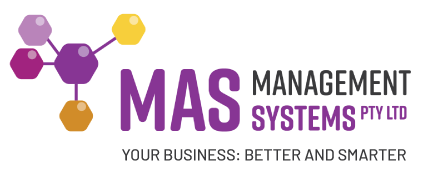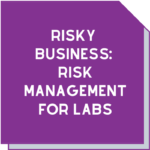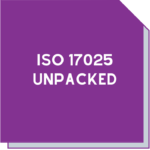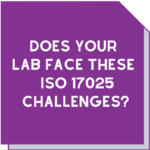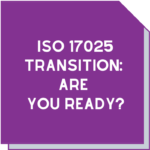ISO/IEC 17025 – where does your lab get stuck?
 While no longer the ‘new’ version of the Standard, when the 2017 version of ISO/IEC 17025 was released there was quite a bit of anxiety about the changes and how they should be implemented.
While no longer the ‘new’ version of the Standard, when the 2017 version of ISO/IEC 17025 was released there was quite a bit of anxiety about the changes and how they should be implemented.
This was particularly the case for NATA accredited labs whose first assessment visits after the standard was implemented were sometimes nerve wracking!
Four years down the track, we’ve had fires, floods, and pandemics to overcome. But that doesn’t mean that there isn’t still some anxiety when assessment time rolls around.
Although you’ve probably got most of this covered, there may still be some aspects of ISO/IEC 17025 that you struggle with.
Based on our observations, we’ve put together 6 sections of the standard where labs could potentially come unstuck. So, in no particular order, here we go:
Number 1: Equipment (6.4)
Equipment refers to all types of lab resources. This includes measuring equipment, reagents, reference standards etc. The lab will need to have procedures for managing all equipment, from handling and transport through to maintenance. That’s a lot of ground to cover! It’s often the aspects of handling and transport procedures that trip labs up.
There’s even a list in 6.4.13 of specific equipment records that laboratories must maintain for all the equipment in their facility. If your equipment can influence the activities listed on your scope of accreditation, it will need to comply with this clause.
Number 2: Management reviews (8.9)
 While section 8.9 covers management reviews in general, clause 8.9.2 contains a list of information.
While section 8.9 covers management reviews in general, clause 8.9.2 contains a list of information.
This list of 15 items is what must be covered as part of the management review.
The items in 8.9.3 are not additional topics to discuss. But your records do need to show that decisions and actions have been taken in relation to each of those 15 items. In particular, you should be aware of things like effectiveness and resources. And don’t forget about the interaction between section 8.5 and this section.
We’ve written previously about management reviews so it’s probably worth revisiting this article if you’re struggling with this clause.
Number 3: Personnel (6.2)
While we’re sure all your staff are competent and know exactly what they’re doing, NATA won’t take your word for it!
6.2.5 covers procedures and records. Your lab must have these to demonstrate a broader range of HR processes, beyond competence, training and monitoring of the competence of your staff. You must adhere to these for all relevant personnel and have records of implementing and following these procedures.
You’ll also need to establish and document staff competency requirements and have supporting records (6.2.2 and 6.2.5). These competency requirements need to include training, education, and experience of the various positions in the lab.
Number 4: Technical records (7.5)
This clause is all about the traceability of your results. Your activities must have records that are detailed enough to replicate the exact process that produced them. Who did what, when and how?
This means that you will need to consistently record all relevant factors and you’ll need to retain all the original records and any amendments.
Number 5: Internal auditing (8.8)
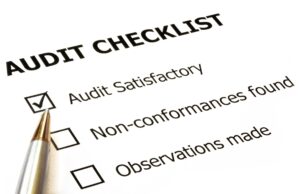 Your internal audit system needs to confirm your lab is compliant to ISO/IEC 17025, your management system, and the lab’s activities.
Your internal audit system needs to confirm your lab is compliant to ISO/IEC 17025, your management system, and the lab’s activities.
This clause allows the lab to decide on the frequency and depth of the audits. This will depend on the lab’s needs and the associated risk of each aspect of its operations.
However, you must keep records of your internal audit plan and implementation of that plan.
Number 6: Ensuring the validity of results (7.7)
This section specifies that your lab must have a procedure for monitoring the validity of its results.
Of course, just because ISO/IEC 17025 states that there shall be ‘a procedure’ doesn’t mean you can’t put this information in several procedures. This could include test or calibration methods where QC activities are often discussed.
This section also includes the required elements that these monitoring activities should address. The lab must collect and analyse data from its monitoring activities and use these to evaluate (and potentially improve) its activities.
Your lab should also monitor its performance by comparing results with other labs (interlab comparisons or proficiency testing). If this option isn’t available, you’ll need to explain why. You’ll also need to demonstrate what you’ve done to mitigate the risks of not carrying this out.
How did you go?
Do you struggle with any of these clauses? Or do you have issues with something else in the Standard?
If you have any problems with implementing ISO/IEC 17025 in your lab, our course is exactly what you need!
Our course is different. Naturally we examine the clauses of the Standard and discuss their application in your lab.
But we also understand that often the reason you want to attend training is because of a specific issue.
Perhaps there’s a clause you don’t understand or don’t know how to implement.
Or perhaps you thought you understood it but at your last assessment, the team said you didn’t, and the lab was given a condition.
So, before the training course we ask you to think about which clauses you need more information about; which ones you’d like to discuss with someone outside your lab and get insights into its implementation.
Then we’ll ask you to send us those clauses and any specific questions before the course starts so we can drill down into those a bit more during the training.
So you’ll get exactly what you need to go back to lab and use right away.
Sounds perfect, right? Our next course is scheduled for 9 February so you can book right now. Or if you’d prefer to have an inhouse session, phone Maree (0411 540 709) or Diane (0402 012 781) or email info@masmangementsystems.com.au.
You don’t have to do this alone!
Download the article ISO/IEC 17025 Where does your lab get stuck?
